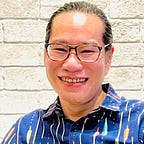Show Not Tell
This World AIDS Day, two-years after the first pandemic of the 21st century, we are presented with a unique opportunity. We can demonstrate to the world that collectively, humans can rise above the politics of division, and unite in response to the defining public health emergency of the 20th century. It is what the world needs to see; that, when taken together, we are more than the sum of our parts.
To do that, we need to be able to show how we’ve managed to put aside our differences, and deliver the kinds of healthcare that truly leaves no one behind. Now, more than ever, populations around the world need to believe that unity is possible; that the collective human spirit will prevail against all odds. Do we have the courage to do so, to embrace the other among us?
It is not as difficult as it may seem. Despite the challenges that still exist, AIDS is one of the best success stories that we have had in global public health. There is much to reflect on, and to celebrate.
Through our responses to AIDS, global health systems have adapted to the needs of people affected by HIV; consultations with affected communities have been integrated into public health decision making from global to regional, from regional to national, and national to local levels. Whenever we cultivate these linkages in relations, we are demonstrating to the world that our differences do not necessarily divide us.
We are living in an increasingly fractured world. As more and more people are enabled by social media to share their opinions publicly, the democratizing effects of technology has upended our information landscapes. Nowadays, people have had to face challenges to their opinions and ways of living, in both frequency and manner, like never before.
Public health efforts in this pandemic have been slow to account for these changes, however. Public health professionals have been telling people what to do, but seemed to have forgotten that the public has other means to obtain and exchange information besides the official narrative. After two years, it is likely the world’s population will have had enough of being told what to do, and how best to protect the public’s health.
Listening and responding to diverse voices are nonetheless not new. People other than those with whom we’ve become accustomed to have always existed. We’ve just managed to keep these disparate communities at a distance, sporadically heard, but seldom understood. We keep them away from us physically and socially.
In many ways, the implementation of physical social distancing measures for the benefit of public health has encouraged and hastened the social embrace in digital spaces. It’s the trade-off from public health measures that the world had not foreseen.
Yet, for those of us working to contain AIDS, the pandemic of the previous century, we’ve had to embrace and make our peace with diverse opinions a long time ago. The informational exchange from global to regional to national and local – linkages we’ve been building for 40 years – is testimony to the possibilities of our collaborative nature. They are longer lasting than the momentary opinions we may hold, no matter how tangible these may seem to us now.
Hence, on the 1st of December this year, I hope we will encourage an embrace of differences, as much as we are likely to inform the world that treatment has been returning millions of people living with HIV to lead productive and normal lives.
We will want to think carefully how to demonstrate what a productive and normal life from living with HIV actually looks like, however, and decide how best to feature and share these images with the world. It is the public relations opportunity of our age.
We may even want to highlight the collaborative advocacy efforts by communities and healthcare professionals that have succeeded in bringing down drug prices, and such that effective lifetime treatment for all is much closer today in reality, than it’s ever been in the history of humanity.
In short, our global public health efforts on AIDS has much to offer the world. Let’s not squander the opportunity with messages of differences, divisions, and debilitations.
It is time to show the world that by embracing the other, we can get through the pandemic constraints that humanity has had to face. Show them, not tell them, what we’ve learnt from AIDS.
Let’s not squander this unique opportunity for global awareness that only ever comes about with an emergency that impacts every single one of us. Let’s share with the world how our responses to AIDS have embraced the other — the unfamiliar, the unwanted, the unlawful — and how it’s renewed our hope for a world that doesn’t yet exist for everyone.
Image: Detail on ‘Hope’ by Banksy at the MOCA, Amsterdam 2018.
